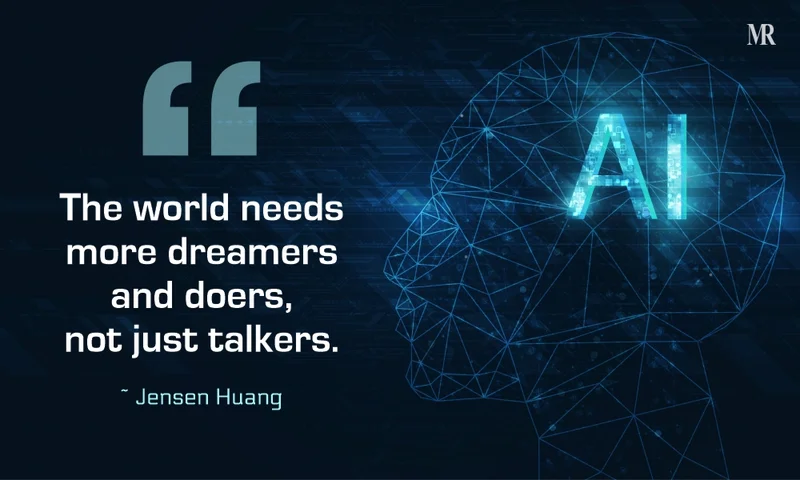360° Financial Trend Detection
360° Financial Trend Detection
So, Arm’s CEO Rene Haas is out here telling campfire stories about his time at Nvidia (Arm CEO on lesson learnt while working under Nvidia founder Jensen Huang: He would change strategy at an off-site meeting meant to…), and the big takeaway is that Jensen Huang is some kind of corporate prophet. Give me a break.
The story goes that during a perfectly boring off-site meeting—you can almost smell the stale coffee and hear the drone of a PowerPoint presentation—the ceo of nvidia, Jensen Huang, stood up and essentially detonated the company’s roadmap. He nuked a whole product line supporting Intel and yanked 2,000 engineers, a full third of the company at the time, onto a new mission.
Haas calls this "vision, speed, fearlessness." I call it a Hail Mary pass.
Let's be real. We're getting the sanitized, after-the-fact, highlight-reel version because it worked. The nvidia stock price today is a monument to that gamble. But this story is being packaged as a "leadership lesson," and that’s where the whole thing falls apart for me.
Imagine being one of those 2,000 engineers. You show up to work on Monday, thinking you’re building the future of Intel support chips. By lunchtime, your entire professional life has been upended by a decree from on high. Your project is dead. Your team is scattered. You’re now working on some Arm-based thing you’ve barely heard of. Fun times.
This isn't a gentle course correction. This is a general burning the boats to force his army to fight. It's a dictator's move, not a collaborator's. It's a textbook example of leadership. No, 'leadership' is too clean—it's a textbook example of a brutal, high-stakes gamble that could have just as easily cratered the entire company.

We celebrate this because Nvidia is now a trillion-dollar monster. But how many companies have tried to pull a "Jensen" and ended up as a smoking crater in the ground? For every successful pivot, there are a hundred failures we never hear about because dead companies don't give keynote speeches at the All-In Summit. Is this truly a lesson in genius, or is it just the most extreme case of survivorship bias we've seen in a decade? And what does it say about the cult of the CEO that we lionize this kind of top-down, shock-and-awe management?
The people who pay the price for these "visionary" moves are never the ones in the C-suite, they're the ones whose projects just got vaporized and... well, you get the picture.
Now every mid-level manager who reads this story is going to think they need their own "bold pivot" moment. They're going to stand up in a meeting and make some dramatic pronouncement, convinced they're channeling their inner Jensen Huang. The result ain't gonna be the next AI revolution. It's going to be chaos, plummeting morale, and a bunch of confused employees updating their resumes.
This whole thing reminds me of those awful corporate retreats where you're forced to do "trust falls." The CEO makes a big speech about taking risks, but the only one taking a real risk is the poor sap in accounting who has to trust his colleagues will catch him. The CEO, offcourse, is standing safely on the sidelines, watching.
Rene Haas says he learned a lot. I'm sure he did. He learned that if you have absolute power and an appetite for risk that would make a Vegas whale blush, you might win big. But let’s not pretend this is a strategy. It’s a lottery ticket. And now that Haas is running Arm, one of Nvidia's key partners, he's being coy about whether he'd ever compete with them. Why? Because he learned the other part of the lesson: know who has the bigger stack of chips at the table.
Then again, maybe I'm the crazy one here. Maybe this is just how giants are made, and the rest of us are just too timid to get it. But I doubt it.
Let's stop dressing this up as some kind of inspirational business school case study. The real story isn't about "vision" or "fearlessness." It's a story about power. It’s about a CEO who had enough control to bet the entire farm on a single roll of the dice and got lucky. The lesson isn't to be bold; it's to understand that in Silicon Valley, the line between "visionary" and "unemployed" is terrifyingly thin, and the difference is usually just dumb luck.